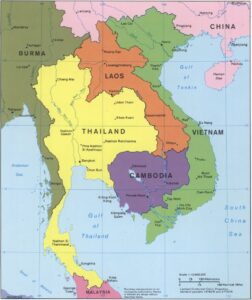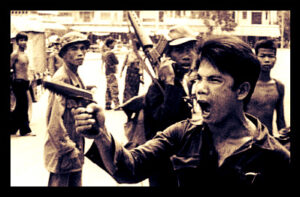Quick! Where is Cambodia?
It lies in Southeast Asia, between Vietnam, Thailand, and Laos. In area, it is slightly smaller than Oklahoma.

For most folks living in Southwest Virginia, Cambodia is probably not among the top three thoughts occupying our minds. However, a young couple planning to minister as Christian missionaries in that nation recently spoke at church, and their visit has brought Cambodia to mind. In Lessons from Cambodia Part I and Part II, we revisit that nation’s tragic history from the late 1970s.
In 1975, when the communists called the Khmer Rouge took over the country by violent force, Cambodia had some eight million people. That is about the population of Virginia today. However, in a mere three years, eight months, and twenty days, communism caused the death of about one-fourth of the population.
In other words, imagine the population of Virginia, then ponder the equivalent of some 15-22 Roanoke Cities being wiped out in less than four years.
The global cry after the Nazi Holocaust ended in 1945 was “Never Again!” However, the Cambodian genocide began exactly 30 years after that–in 1975.

As I sought to point out in Part II, there are many disturbing parallels between the Khmer Rouge Reign of Terror and the US today. Mind you, I am not asserting things are exactly the same. That would be flatly untrue. But, there are clear parallels. Don’t take my word for it. Read on, think for yourself, and draw your own conclusions.
- Total Dependency: The Khmer Rouge took over all private property and means of production, emptied the cities, banned currency, and drove the masses to the countryside to work on collective farms. The workers slaved all day under the tropical sun and watchful eyes of the armed teenaged guards, and then the camp bigwigs doled out starvation-level bowls of rice gruel from what they had raised. In other words, all work went to the state, and the state fed you as much (or as little) as they wished.
Nowadays in the US?
In late April my wife and I flew into Phoenix and went to pick up a rental car friends had already booked. “What’s up with this huge line?” I wondered as we entered the rental car center. Plus, only one agency was open: the others were all dark and unstaffed. As it turned out, we had to wait over two hours to pick up a vehicle…and there were maybe 100 people still in line behind us! When we finally got to the service window, I asked the clerk about the hold-up. “With all the government payments, we have a hard time finding people who want to work,” he explained.
(To be fair: some news reports also indicate that many rental agencies sold their fleets just to stay afloat during the pandemic, so now they are short on vehicles. However, I am telling you what the clerks told us; and since they work there, they should know.)
In countless ways, we are seeing big government foster dependency which in turn kills work ethic and independence. This has been going on for decades, but it is now accelerating.
- Intolerant Secularism: As predominantly Buddhist Cambodia fell to the Khmer Rouge, some of the first targets for execution were Buddhist monks, Catholic priests and nuns, and other religious adherents. Marxism is a jealous belief system. It demands total obedience and control, and thus religious followers–who believe in a higher power and life after death–were marked for immediate extermination.
Nowadays here?
There is an inexorable pressure to intimidate believers to “privatize” their faith. That is, you can say and believe what you want–as long as you keep it inside the four walls of your home or sanctuary.
But outside, on the job or in the public square? Best keep your mouth shut. For several years now we have seen the tragedy of leftists targeting and seeking to destroy businesses owned by artists and entrepreneurs who want to conduct their jobs by the dictates of their consciences and beliefs.
Of course, the leftists do not claim to be acting in the name of Marxism. That sounds bad and would rub people the wrong way. Instead, they claim to be protecting us all from discrimination.
However, few people realize that the truly intolerant folks are the ones practicing discrimination against people who simply disagree with them. Frankly, some people who are crafty with language have weaponized the word “discrimination” and are using it as a kind of verbal sledgehammer to intimidate other folk into silence and compliance.
And this is not being done by some nefarious “talking heads” in far-off places like New York or San Francisco. Right here in Southwest Virginia, we have local politicians like State Sen. John Edwards (D-Roanoke), Del. Sam Rasoul (D-Roanoke), and Chris Hurst (D-Blacksburg) whose jargon and voting records place them squarely in that category.
In the past few months, we have seen the Biden administration and some of its leftist allies put America’s Christian colleges and universities in their trigger hairs, all under the guise of “inclusion” and “anti-discrimination.”
For the Left, it is a handy twofer: push widespread ignorance and intolerant secularism, all in one punch, while cleverly portraying oneself as taking the higher moral ground.
(For more about the dishonesty behind America’s current anti-discrimination binge, read “Be Discriminating When Describing Discrimination.”)
- Massive Reset: The Cambodian communists were so intent on “resetting” their culture and creating a Maoist utopia, they renamed the country “Democratic Kampuchea” (DK). (Note the adjective “Democratic.”) They also renamed the year they seized power–1975–as “Year Zero.” They even made thinking about the past a crime–a crime they called “memory sickness”–punishable by death.

Today here? For several months now, there has been talk in the US and elsewhere about the upcoming “Great Reset.” What exactly is this “Reset”? How far will it go? What will change? Who wins? What will we lose? Who gets to decide? For now, the answers seem to be: “We don’t know. We will see.”
All this ambiguity makes many feel uneasy, and history shows us how some “resets” end badly.
Many are concerned, with the involuntary “extreme makeover” our country is getting–usually despite public opposition–is the USA fast becoming the USSSA? The Union of Soviet Socialist States of America?
This we know: the “Reset” here in the US is not over. Will we heed lessons from history, or blithely coo “That could never happen here”? Will we passively tolerate the “Reset” whether we like it or not, or actively support our founding liberties and work for a better future for our children and grandchildren?
What do you think?

– Scott Dreyer
